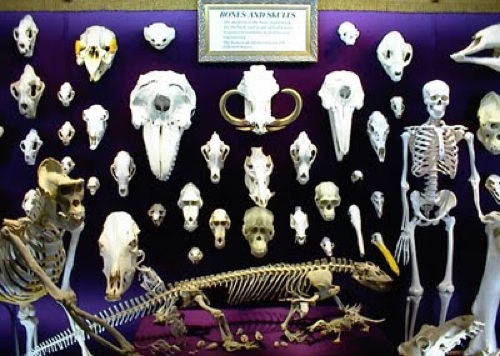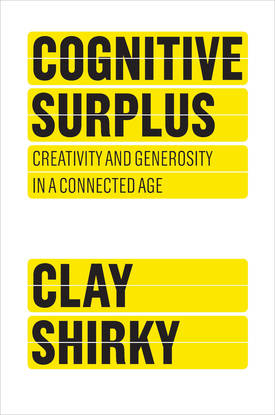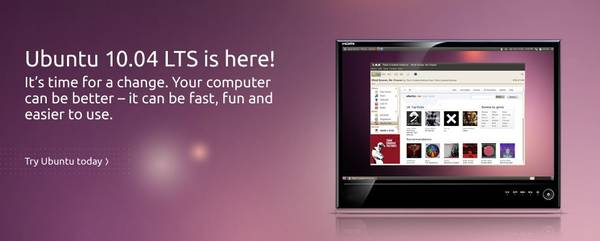Search This Blog
Saturday, June 12, 2010
(title unknown)
Thursday, June 10, 2010
Mona Lisa replicated in software "using only 50 semi transparent polygons"

Roger Alsing created a small program that keeps a string of DNA for polygon rendering. He explains the procedure:
0) Setup a random DNA string (application start)
1) Copy the current DNA sequence and mutate it slightly
2) Use the new DNA to render polygons onto a canvas
3) Compare the canvas to the source image
4) If the new painting looks more like the source imag
e than the previous painting did, then overwrite the current DNA with the new DNA
5) repeat from 1
Now to the interesting part. Could you paint a replica of the Mona Lisa using only 50 semi transparent polygons? That is the challenge I decided to put my application up to.
You can see the whole unfolding here. It's pretty cool!
Ubuntu Lucid Lynx: free OS that Just Works
Today, I got caught up enough from my tour to update my ThinkPad to the latest version of Ubuntu. Lucid Lynx went in like butter. The update ran unattended, took about 1h including downloading the whole OS, updated all of my apps without a hitch, and is running smoothly. I'll let you know if anything breaks, but this looks like yet another flawless Ubuntu update for me, making me a very, very satisfied user indeed.
I know I once promised to document my Ubuntu Linux changeover in detail, but it doesn't look like it's going to happen. To be honest, there just wasn't much to write about. I bought a ThinkPad (currently using the X200, lusting after the X201), downloaded and burned a CD, stuck it in the drive, turned it on, clicked 'Install.' To move my data over from my old Mac, I booted it into USB-drive mode and dragged the files over. Getting DRM'ed audiobooks out of iTunes was the hardest part (all hail AudioHijack, which let me capture the files, though it took a month's constant playback on three old Powerbooks to convert my thousands of dollars' worth of Audible books to MP3 so I could take them with).
Since then, it's Just Worked. When I need to do something new -- edit audio, say -- I go to the software center and look at what apps exist for that purpose, select some highly rated ones, download them, try them, keep the one I like (all the software is free, so this is easy). Migrating to new machines? Easy. Just take my list of installed apps to the new machine as a text-file on a USB key and ask Software Center to download them and configure them. Backups? Easy: external generic USB drive and rsync (exactly what I used with my Mac).
For the first two or three weeks, there was some disorientation. None of the things I used were where I expected to find them. It was the OS equivalent of when we remodeled the kitchen and it took me two weeks to remember where the new cutlery drawer was. Then the OS vanished: of course it did. It's plumbing. You're not supposed to notice plumbing. If you have to notice plumbing, there's something wrong with the plumbing.
Do I have to type in a lot of arcane command-line gibberish? No. I sometimes choose to because I like having little pythony things lying around that friends have written for me or that I've pieced together myself, but that was true on my Mac as well. I could happily do all the important things on my machine without ever touching the terminal.
Does everything work? Hell yeah. Ubuntu's support for arcane stuff like 3G modems is vastly superior to anything I've seen on the Mac or Windows: just plug in the modem, wait for it to autodetect, confirm its guess, and go. The sexy multifunction Logitech mouse? Just worked -- no drivers required. My HP all-in-one scanner/copier/printer? Just worked. Webcams, USB mics, etc etc? Never had to download a driver, never had to install a driver: they just worked.
Oh, sure, sometimes I don't know off the bat how to do something a little arcane (after I replaced the UK keyboard my ThinkPad came with with the US version, I had to figure out where to tell the OS about it, for instance), but it's never more than one or two googles away. And sometimes apps crash, but not often -- and the OS itself has crashed so infrequently that the most common cause of my reboots is running out of battery.
The folks at Canonical were kind enough to give me a comp support account, and I've used it a couple times for weird, dire things, like recovering from serious hardware errors or getting the crypto stuff on my encrypted partition just right, and they are excellent, but these are the kinds of problems I expect to need a hint or two from an expert with.
So there you have it: Ubuntu: It Just Works. Install it, spend two weeks wondering where the cutlery drawer is, watch it disappear. Thereafter, only notice it when it does something amazing, like flawless OS updates or very simple transfers to new machines.
You can download and burn a Lucid Lynx CD free, boot any machine from it, and give Ubuntu a test-drive. Try it!
- Wubi: Install Ubuntu on Windows like installing an app
- Mark Pilgrim's list of Ubuntu essentials for ex-Mac users - Boing ...
- Ubuntu 8.04 Hardy Heron is out Gadgets
- New Ubuntu Linux release is easy, sexy
- Ubuntu for non-geeks
- Ubuntu Netbook Remix looks great Gadgets
- Dell will pre-install Ubuntu Linux
- Manga about running Ubuntu
Photos of amazing NuPenny toy store in Portland, Maine

I'm sorry I missed the 'Grand Not Opening' of Randy Regier's NuPenny Toy store in Portland, Maine last Friday.
Randy had this to say about NuPenny:
[P]erhaps most compelling for me was to attempt to create a physical place and occurrence that appears as if in a dream - familiar and believable yet somehow out of our grasp - in the physical sense but also slightly out of reach of our collective memory. Because of this the door of the NuPenny store is always locked and all text has been rendered in Teletype punch-tape code. The toys are all original constructions of mine; none of the toys are or were vintage playthings, nor are any of them made from toy parts. All toys in my NuPenny store are manufactured from 20th century industrial, scientific and household flotsam and jetsam, and from scratch when necessary.Conceptually each toy is my interpretation of a song lyric, poem or literary work that has affected me. By using the NuPenny/Teletype code card that is available on this site you can easily (though perhaps not quickly) read the 'text' on each toy, box and placard. More toys will occur, and arrive in the store over time, as I have the means to make them.
More photos after the jump.



Data shows San Francisco is full of nerds

According to data from the US Census Bureau, San Francisco has more people with bachelors' or graduate degrees per square mile than any other city.
Link [via @waterslicer]![]()
Auction of creationist museum's curiosities

Georgia's creationist natural history museum, The Gallery of Creation, is liquidating its entire astounding collection of curiosities in an auction June 25 and 26. Internet bidding available through Higgenbotham Auctioneers! Just a few of the amazing items include:
• authentic mammoth teeth
• leaves fossils
• 3-pc dinosaur fossil
• wooly mammoth hair
• animated elephant display
• dinosaur replicas
• mummified cat from Egypt
• animated pandas and display case
• mammals and sea life display cases
• oils on canvas
Auction: Gallery of Creation (via Morbid Anatomy)
Clay Shirky's COGNITIVE SURPLUS: how the net lets us share and do more than ever

Clay Shirky's second book, The
Cognitive Surplus, picks up where his stellar debut, Here
Comes Everybody left off: explaining how the net's lowered costs for
group activity allow us to be creative and even generous in ways that we
never anticipated and haven't yet fully taken account of.
Shirky's hypothesis is that a lot of the 20th century stuff we used to
take for granted -- most people didn't want to create media, people
didn't value homemade and amateur productions, no one would pitch in to
create something for others to enjoy unless they were being paid --
weren't immutable laws of nature, but accidents of history. The Internet
has undone those accidents, by making it possible for more people to
make and do cool stuff, especially together.
Cognitive Surplus fizzes with great insights about how people
use networks and interact with each other. For example, Shirky dismisses
generational explanations for technology use and misuse. He rejects the
idea that kids today value their privacy less than their forebears
because they put all their personal info on Facebook, proffering this
explanation instead: the older generation kept its info off of Facebook
in the 1980s because Facebook didn't exist then, not because they
possessed the wisdom to abstain from oversharing. Likewise, there's
nothing inherent about being a senior citizen that makes it implausible
that you'll use email -- which is why there are so many elderly emailers
today.
But the meat of the argument is about how the best explanation for many
of the group phenomena we see online, from ICanHazCheezburger to
Wikipedia, is that people like sharing with each other and
collaborating. Not always, of course. But there are architectures of
participation that encourage the kind of sharing and generosity that
enriches us all, and by experimenting with them, we can create media and
social change that harnesses millions of people to help and amuse each
other.
Shirky is very good on the connection between trivial entertainments and
serious business, from writing web-servers to changing government.
Lolcats aren't particularly virtuous examples of generosity and sharing,
but they are a kind of gateway drug between zero participation and some
participation. The difference between 'zero' and 'some' being the
greatest one there is, it is possible and even likely that lolcatters
will go on, some day, to do something of more note together. These
sections are a warm and compelling rebuttal to people who argue that the
net is a fad or a toxic waste heap, and his systematic argument is so
well-reasoned that it might as well be a road-map for winning
frustrating arguments about the net.
The last chapter of the book is a kind of roadmap for building your own
structures for enabling participation, drawn from Clay's long history of
teaching and consulting, and it's as practical as the rest is theoretical.
Cognitive Surplus continues to prove that Clay Shirky is one of
the best thinkers and advocates the net has. It's a delight to read and
will change how you think about the future.
The
Cognitive Surplus: Creativity and Generosity in a Connected Age
Previously:
- Clay
Shirky on information overload versus filter failure - Clay
Shirky's advice for women: go ahead, be an asshole! - Clay
Shirky's Harvard talk: Here Comes Everybody - Clay
Shirky's masterpiece: Here Comes Everybody - Clay
Shirky on Colbert - Clay
Shirky on traditional media: "2009 is going to be a bloodbath
... - Here
Comes Clay Shirky (The Changing of the Guestbloggers) - Boing ...

